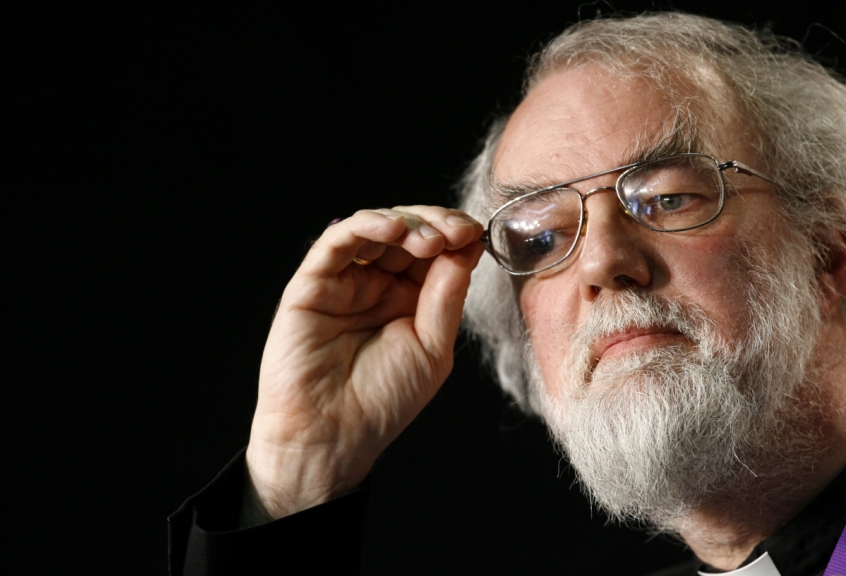
Rowan Williams has written a powerful letter to Vice Chancellor of Manchester University over the institution's ongoing refusal to remove books by the convicted Holocaust denier David Irving from open display in its main library.
Dr Williams, the former Archbishop of Canterbury, says the issue needs 'urgent attention' and warns that the current arrangement of Irving's work 'could be experienced as threatening by Jewish members of the University'.
The intervention by Dr Williams comes amid a growing row over the unmarked presence of Irving material in Manchester University's John Rylands library, and a wider argument about antisemitism at British universities.
In February, Christian Today revealed that Churchill College, Cambridge removed Irving's books from 'open access' after a complaint from an eminent Jewish historian, Irene Lancaster.
Lancaster, who was Manchester University's first Teaching Fellow in Jewish history, has repeatedly requested in recent weeks that the university follows suit.
Now Williams, who is Master of Magdalene College, Cambridge, has written to Dame Nancy Rothwell, Manchester University's President and Vice Chancellor.
The letter appeals to Manchester University's long and distinguished tradition of Jewish studies.
Williams writes: 'I ... have concerns over the shelving of works like those of Irving alongside routine historical texts. Given that his work has been declared by experts like my colleague Sir Richard Evans to be undeserving of the name of history and to be characterised by deliberate falsification of material, it is not a question of alternative interpretations of history or of expressions of simple opinion, but of a very specific genre of literature, quite distinct from history.
'Of course students should be allowed to read it for approved academic purposes, but there is, it seems to me, a strong case for shelving or labelling it independently to clarify its nature. And not doing so could be open to the challenge that its presence without such clarification could be experienced as threatening by Jewish members of the University, in the sense spelled out in official definitions of anti-semitism and listed on the website, "The Law of Anti-Semitism".
'At a time when there is, nationally and internationally, a measureable rise in the expression of extremist views I believe that this question needs urgent attention.'
In a statement to Christian Today last month, a spokesperson for Manchester University said: 'It is true that David Irving's books are available from the University Library...The University's position is that it is important that students should be able to read Irving when they write their essays about Holocaust denial. Their availability...shows that our students are discerning persons.'
The response followed appeals from the Labour MP for Blackley and Broughton, Graham Stringer, who has also written to Dame Nancy.
Lancaster, who has engaged in extensive research on the Holocaust and has worked with the Yad Vashem Holocaust memorial centre in Jerusalem, described Manchester University's position as 'a disgrace'. She pointed out that 'Irving is seductive to students and immature minds'.
This week, Christian Today reported that Irving had praised Manchester University's 'suitably frosty reply' to Lancaster, whom he repeatedly described on his website as 'the Jewess'.
The developments come after the Minister for Higher Education, Jo Johnson, urged institutions to tackle 'intimidation and violence' against Jewish students.
In February, Johnson wrote to the chief executives of the representative bodies for higher education institutions, reminding them of their responsibility to ensure students do not suffer 'discrimination, harassment or victimisation'.
That same month, Rowan Williams wrote to Johnson expressing concern about the presence of Holocaust-denying material on open display at university libraries.
In his letter, Williams suggested that the government should hold a position on the subject, and pointed to the 'Prevent' legislation as being a possible tool for tackling the issue.
Williams said that Holocaust-denying material should be labelled and available on request and not indiscriminately, and compared it to jihadi material.
In a statement this afternoon, Manchester University said that the books will remain on display, but that it is 'investigating ways to re-catalogue' them.
'In reaching the decision to keep these books on display, The University of Manchester has consulted both within our own Centre for Jewish Studies, and with the majority of the UK's research libraries: many of which also adopt the same approach. We are investigating ways to re-catalogue the books but they will remain available to staff and students who have access to our library service,' the statement said.
'The University is committed to allowing our students to have access to challenging and controversial works on many different subjects in order to pursue their studies. This is in line with the established International Federation of Library Associations and Institutions' Statement on Libraries and Intellectual Freedom.
'This approach in no way compromises the University's fundamental rejection of discrimination which is at the heart of how we seek to educate students and pursue our research activities.'













